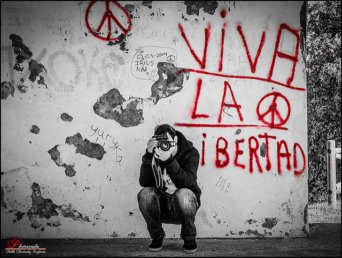- About
- Topics
- Picks
- Audio
- Story
- In-Depth
- Opinion
- News
- Donate
- Signup for our newsletterOur Editors' Best Picks.Send
Read, Debate: Engage.
Last week, a musician was sentenced to 3.5 years in a Spanish jail for making jokes about the monarchy. We also learned that a book will be withdrawn from bookshops for containing references to a Popular Party mayor and that several paintings have been removed from the ARCO art fair as they mention "Political Prisoners." Happening within just 24 hours this series of news stories has raised eyebrows regarding the restriction of freedom of expression in Spain today, recalling memories of the darkest times of Francisco Franco's dictatorship, which the country is still managing to fully overcome.
Although freedom of expression is guaranteed in Article 20 of the Spanish Constitution, the actions taken against a rapper, a writer and a visual artist lay bare infringements to this fundamental right, also representing a backwards step with respect to artistic freedom.
Born in the Balearic Islands, musician Valtonyc was found guilty of crimes of praising terrorism, defamation to the Crown and death threats found within his song lyrics. Although he said that it was only a metaphor, the rapper will still have to go to prison, from which he intends to apply to the European Court of Human Rights based in Strasbourg.
On the same day, another judge ordered bookshops to remove "Fariña", a book written by journalist Nacho Carretero on drug trafficking in Galicia, at the request of a former mayor of the Popular Party who was mentioned in the text. One of the most immediate effects was the transformation of the book into a bestseller, arriving in a few hours to thee number one spots in several bookstores.
While the debate on the two controversial judicial decisions raged on, another case of censorship occurred, with the decision of the Ifema Trade Fair in Madrid to order the removal of a series of photographs by Santiago Serra, entitled “Political Prisoners in Contemporary Spain.” The exhibition portrayed the Catalan politicians who remain in prison accused of rebellion because of their involvement in the pro-independence process. As well as undermining the image of an artistic event that presents itself as innovative and transgressive, the decision also highlights the climate of persecution in today’s Spain.
In addition to being unjust and arbitrary, the recent cases of censorship are also counterproductive. Justified by the need to avoid controversy and stifle debate, they have instead created yet more controversy, placing these acts at the heart of the public discourse.
At a time when democracy in Spain has already been badly shaken due to the police brutality witnessed during the referendum on Catalan independence held last October, and on top of the arrest of several Catalan politicians, these new cases of censorship show the remnants of the Franco regime are still alive today.
